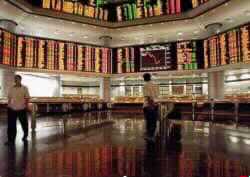Russian President Vladimir Putin called Thursday for a political solution to the Iraq crisis through existing U.N. resolutions, a move which could undermine U.S. demands for tough international action against Baghdad. "We favor a rapid resolution of the situation around (Iraq) on the basis of existing U.N. Security Council resolutions, and in accordance with the principles and norms of international law," he said in a Kremlin ceremony
The United States is pushing for a new U.N. resolution which would include tough language spelling out that Iraqi leader Saddam Hussein would face serious consequences if he failed to allow weapons inspectors to proceed with their work unhindered.
Resumption of U.N. inspections for chemical, biological and nuclear weapons for the first time since 1998 would "answer the concerns of the international community," Putin told the new Iraqi ambassador after receiving his credentials.
The Russian leader made his comments the day after his foreign minister dismissed suggestions Russia, which has a veto in the U.N. Security Council, had moved closer to the United States and Britain in agreeing on a tougher stand to ensure Iraq met all demands of arms monitors.
Igor Ivanov told reporters that only specialists could judge whether Iraq had weapons of mass destruction, and dismissed as a "propaganda furor" a British report detailing the threat posed by Saddam to the international community.
"We should wait for the conclusions of the experts. Only after that can any conclusions be drawn," Ivanov said on Wednesday.
Russia hopes eventually to recoup billions of dollars in Soviet-era debt and take part in lucrative Iraqi oil projects once decade-old U.N. sanctions on Baghdad are lifted. Moscow has long called for the return of inspectors as an initial step.
It applauded Iraq's decision to allow the monitors to resume their activities for the first time since they left in 1998.
Russian Defense Minister Sergei Ivanov has suggested that talks in the Security Council on a new resolution could go ahead at the same time as inspections proceeded in Baghdad.
That prompted Britain's ambassador to Moscow to say on Tuesday that he believed Russia was moving closer to Washington and London on the need for joint U.N. action.
Ivanov however slapped down that suggestion, saying no U.N. resolution was under formal discussion.
Iraq: U.S. Strikes Civilian Airport
Iraq meanwhile said an allied airstrike early Thursday hit its civilian airport in the southern port city of Basra. The announcement did not mention casualties.
A Pentagon official confirmed there was a strike early Thursday, but had no other details.
Iraq quickly condemned the strike.
"This terrorist act is a breach of international civilian aviation regulations," an announcer on Iraq's state-owned satellite channel said.
The announcer said the attack targeted the airport's radar system and that the terminal building also was damaged. No further details were immediately announced.
The United States and Britain have patrolled zones in northern and southern Iraq since the 1991 Gulf War , declaring the areas off limits to Iraqi aircraft to protect Kurds in the north and Shiites in the south. The allies say they do not target civilians, but respond when Iraqi military radar lock onto their fighter planes.
Wednesday, U.S. defense officials announced a double strike at two southeastern installations. Precision-guided weapons were aimed at a radar facility near Al Amarah about 165 miles southeast of Baghdad and a defense communications facility at Tallil, about 170 miles southeast of the capital, according to a statement from the U.S. Central Command in Florida.
The statement did not say how effective the strike was, only that damage assessment was ongoing.
PHOTO CAPTION
Investors study the share prices at a private stock market gallery in Kuala Lumpur, Thursday, Sept. 26, 2002. Share prices on the Kuala Lumpur Stock Exchange drifted lower at mid afternoon Thursday. A dealer said the technical rebound in early trade was shortlived as market sentiment remained weak following uncertainties in external factors include the unresolved US-Iraq issue which has the possibility of turning into a war, he added. The Kuala Lumpur Composite Index (KLCI) drop 1.81 to 634.94. (AP Photo/Andy Wong)
- Sep 26 5:52 AM ET
- Author:
& News Agencies - Section:
WORLD HEADLINES


 Home
Home Discover Islam
Discover Islam Quran Recitations
Quran Recitations Lectures
Lectures
 Fatwa
Fatwa Articles
Articles Fiqh
Fiqh E-Books
E-Books Boys & Girls
Boys & Girls  Women
Women










